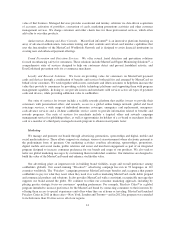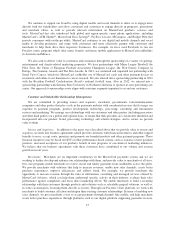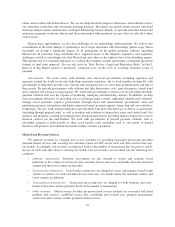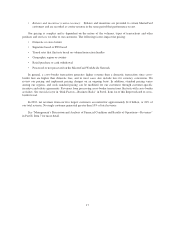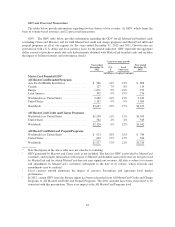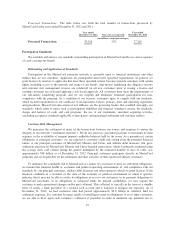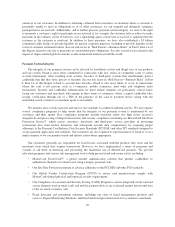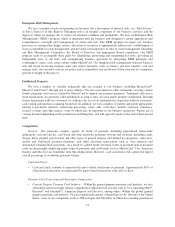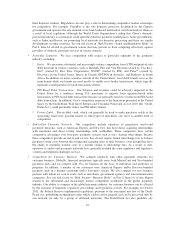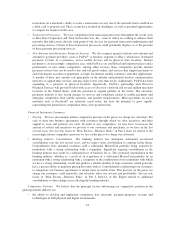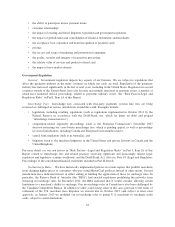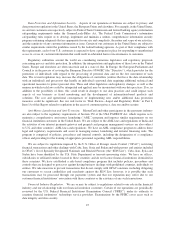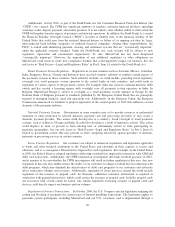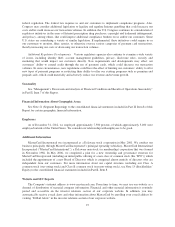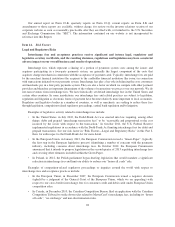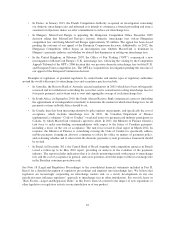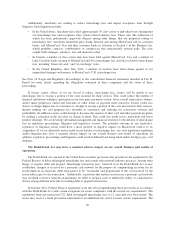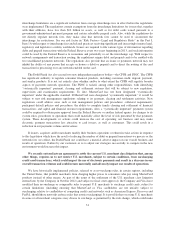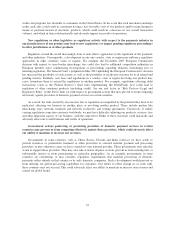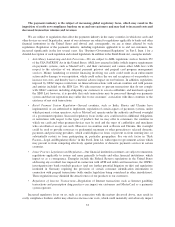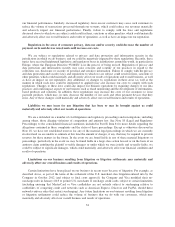MasterCard 2012 Annual Report Download - page 28
Download and view the complete annual report
Please find page 28 of the 2012 MasterCard annual report below. You can navigate through the pages in the report by either clicking on the pages listed below, or by using the keyword search tool below to find specific information within the annual report.• the ability to participate in new payment forms;
• customer relationships;
• the impact of existing and future litigation, legislation and government regulation;
• the impact of globalization and consolidation of financial institutions and merchants;
• the acceptance base, reputation and brand recognition of payment cards;
• pricing;
• the success and scope of marketing and promotional campaigns;
• the quality, security and integrity of transaction processing;
• the relative value of services and products offered; and
• the impact of new market entrants.
Government Regulation
General. Government regulation impacts key aspects of our business. We are subject to regulations that
affect the payments industry in the many countries in which our cards are used. Regulation of the payments
industry has increased significantly in the last several years, including in the United States. Regulators in several
countries outside of the United States have also become increasingly interested in payment issues, a number of
which have launched official proceedings related to payments industry issues. See “Risk Factors-Legal and
Regulatory Risks” in Part I, Item 1A of this Report.
Interchange Fees. Interchange fees associated with four-party payments systems like ours are being
reviewed or challenged in various jurisdictions around the world. Examples include:
• legislation, including resulting regulations (such as regulations implemented in October 2011 by the
Federal Reserve in accordance with the Dodd-Frank Act, which set limits on debit and prepaid
“interchange transaction fees”);
• competition-related regulatory proceedings (such as the European Commission’s December 2007
decision restricting our cross-border interchange fees, which is pending appeal, as well as proceedings
in several jurisdictions, including Canada and European Union member states);
• central bank regulation (such as in Australia); and
• litigation (such as the merchant litigations in the United States and private lawsuits in Canada and the
United Kingdom).
For more detail, see our risk factors in “Risk Factors—Legal and Regulatory Risks” in Part I, Item 1A of this
Report related to interchange fees and related practices receiving significant and increasingly intense legal,
regulatory and legislative scrutiny worldwide, and the Dodd-Frank Act. Also see Note 18 (Legal and Regulatory
Proceedings) to the consolidated financial statements included in Part II, Item 8.
No-Surcharge Rules. We have historically implemented policies in certain regions that prohibit merchants
from charging higher prices to consumers who pay using MasterCard products instead of other means. Several
jurisdictions have indicated interest in either ending or limiting the application of these no-surcharge rules. In
particular, the Reserve Bank of Australia (the “RBA”) had enacted regulations prohibiting the networks from
enforcing no-surcharge rules. In December 2011, the RBA indicated that it would consider allowing certain
limitations to a merchant’s ability to surcharge. Our no-surcharge rules in Canada have also been challenged by
the Canadian Competition Bureau. In addition to other action being taken in this area, pursuant to the terms of
settlement of the U.S. merchant class litigation we entered into in October 2012 (and subject to final court
approval), in January 2013 we modified our no-surcharge rules to permit U.S. merchants to surcharge credit
cards, subject to certain limitations.
24


